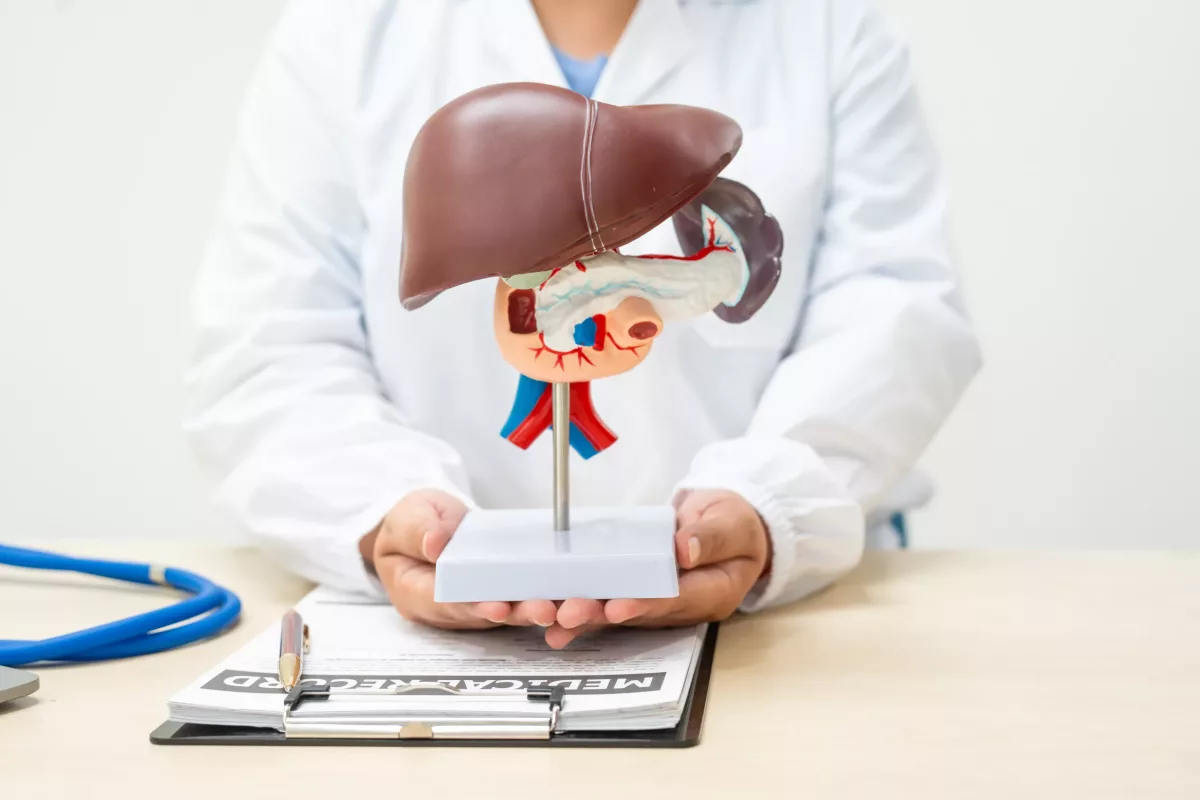Inflammation (swelling) of the liver caused by alcohol drinking is called alcoholic hepatitis. Alcohol destroys liver cells. However, not everyone who drinks high amounts of alcohol develops this condition. It often occurs in people who drink alcohol for long periods. On the other hand, alcoholic hepatitis can happen in a person who drinks alcohol in moderation.
Those who are diagnosed with this condition should stop drinking alcohol immediately. Otherwise, they are at increased risk of permanent liver damage and even death.
Symptoms
One of the most common symptoms of alcoholic hepatitis is jaundice (yellowing of the whites of the eyes and skin). However, people with this condition may also experience other symptoms. For example:
- Appetite changes
- Nausea
- Vomiting
- Abdominal tenderness
- Bloating
- Fever
- Tiredness
- Weakness
Commonly, people with this condition are malnourished because alcohol prevents people from being hungry. As a result, most of the calories they get are from alcohol. Check below some symptoms that often occur in severe cases:
- Ascites (fluid buildup in the abdomen)
- Kidney or liver failure
- Confusion caused by toxin buildup
Immediately visit a doctor if any of the following symptoms occur. For example, inability to control drinking, alcoholic hepatitis symptoms, or ascites.
Causes
This condition occurs due to damage to the liver caused by alcohol. However, how alcohol damages liver cells and why it occurs only in some heavy drinkers is not fully clear. Healthcare providers have identified some factors that play a role in alcoholic hepatitis. For example:
- The way your body breaks down alcohol
- Certain chemicals that trigger swelling and destroy liver cells
- If you do not get treatment, scar tissue may replace healthy tissue, which prevents your liver from working properly
- Cirrhosis (this is the final stage of alcoholic liver disease)
- Other types of liver disease, including hepatitis C, hepatitis B, and others
- Malnutrition – Those who drink too much alcohol usually do not get enough nutrients. Therefore, it can also cause damage to the liver cells.
Risk Factors
One of the biggest risk factors for this condition is the amount of alcohol you drink. However, it is not known how much alcohol you should drink to develop this condition. Most people who are diagnosed with alcoholic hepatitis have had at least 7 drinks per day for 20 years or more. Furthermore, some people may develop this condition who drink less but have other risk factors. For example:
- Sex – Females are more likely to develop alcoholic hepatitis because of the way their bodies break down alcohol.
- Obesity – Excessive body weight significantly increases the risk of alcoholic hepatitis.
- Genes – Some research suggests that genes could be involved in alcoholic hepatitis.
- Race and ethnicity – Hispanic and Black people are more prone to develop this condition.
- Binge drinking – This condition also increases the risk of developing alcoholic hepatitis.
What Are The Potential Complications of Alcoholic Hepatitis?
There are some complications that may occur in people with this type of hepatitis. These complications are often caused by scar tissue on the liver that slows down blood flow through it. Check below some complications:
- Varices (also called enlarged veins) – When it occurs, blood cannot flow freely through the portal vein into other blood vessels in the stomach and esophagus (a tube that carries food and drinks from the mouth to the stomach).
- Ascites – This is a condition in which fluid builds up in the abdomen (belly). If it gets infected, you may need antibiotics. Generally, this condition is not life-threatening, but it indicates advanced alcoholic hepatitis or cirrhosis.
- Hepatic encephalopathy (it often causes drowsiness, confusion, and slurred speech) – Damage to the liver may reduce its function, which makes it hard to remove toxins from the body. When these toxins begin to build up, it may lead to brain damage. In severe cases, it may lead to coma.
- Kidney failure – If the liver cannot remove all toxins from the blood, it may lead to damage to the kidneys.
- Cirrhosis – This is a very serious condition in which scarring of the liver tissue occurs. It often leads to liver failure.
How to Prevent Alcoholic Hepatitis?
Check below some tips that may help reduce the risk of developing alcoholic hepatitis:
- Drink alcohol in moderation – Generally, you should not drink more than one beverage per day for women and two beverages per day for men. If you are at risk of developing this condition, you should not drink alcohol at all.
- Hepatitis C protection – This condition is caused by a virus, and without treatment, it may lead to cirrhosis.
- Ask your healthcare professional before taking medicines along with alcohol – There are some medicines that may interact with alcohol and cause damage to the liver tissue.
Diagnosis
First, doctors will perform a physical examination and ask some questions about your alcohol use. Thereafter, they may perform some tests to check for liver disease and rule out other conditions that cause similar symptoms. Check below some examples:
- Blood tests
- Liver function tests
- Imaging tests, including a CT (computerized tomography) scan or an MRI (magnetic resonance imaging) scan of the liver
- Liver biopsy (this is a test in which doctors get a small sample of the liver to test it in the laboratory for abnormalities linked with the disease)
Treatment
Treatment for people with alcoholic hepatitis involves stopping alcohol drinking and therapies to reduce the symptoms and prevent further damage to the liver.
Stopping Drinking
Immediately stop drinking alcoholic beverages if you are diagnosed with alcoholic hepatitis. Otherwise, it may lead to permanent damage to the liver and cirrhosis. Those who ignore the symptoms and this condition may experience several life-threatening problems.
If you face problems with quitting drinking, do not hesitate to see a doctor. Treatment often includes:
- Medicines and counseling
- Outpatient or live-in treatment program
- Alcoholics Anonymous or other support groups
Malnutrition Treatment
If you are diagnosed with this condition, doctors often recommend a special diet to treat malnutrition. For people who have trouble eating, doctors may recommend a feeding tube that is passed down to the stomach through the esophagus.
Medicines
The following medications are often recommended in severe cases and to reduce inflammation of the liver. For example:
- Corticosteroids – This group of medications is used to reduce inflammation in people with severe alcoholic hepatitis. However, these medicines should not be used if you have kidney failure, stomach bleeding, or infections.
- Pentoxifylline – This medicine is often prescribed by doctors when you cannot use corticosteroids. Nowadays, it is not clear how well Pentoxifylline works in people with alcoholic hepatitis because study results are different.
- Other treatments – Some studies suggest that N-acetylcysteine may help reduce symptoms and further damage to the liver in people with alcoholic hepatitis.
Liver Transplant
This treatment is recommended when other treatments do not work or the risk of death is high without this treatment.
Previously, people with this condition have not been given new livers because of an increased risk of alcohol drinking again. Moreover, some studies have shown that people with alcoholic hepatitis have a better chance of survival compared to people with other types of liver disease who get transplants.
Frequently Asked Questions
What is alcoholic hepatitis?
This is a liver condition that occurs due to heavy alcohol drinking. It causes inflammation of the liver tissue, and without treatment, it may lead to scarring.
Can you reverse alcoholic hepatitis?
Immediately stop drinking alcohol if you are diagnosed with this condition. Otherwise, it may lead to a life-threatening condition called cirrhosis. If you cannot control the urge to drink alcoholic beverages, discuss it with your healthcare professional.
What is the prognosis for alcoholic hepatitis?
Generally, for men who do not stop drinking alcohol, the 5-year survival rate is about 70% but for women, the same survival rate is about 30%. Furthermore, roughly 40% of people with severe alcohol-induced hepatitis die within 6 months after diagnosis. Ask your healthcare provider if you have additional questions.




